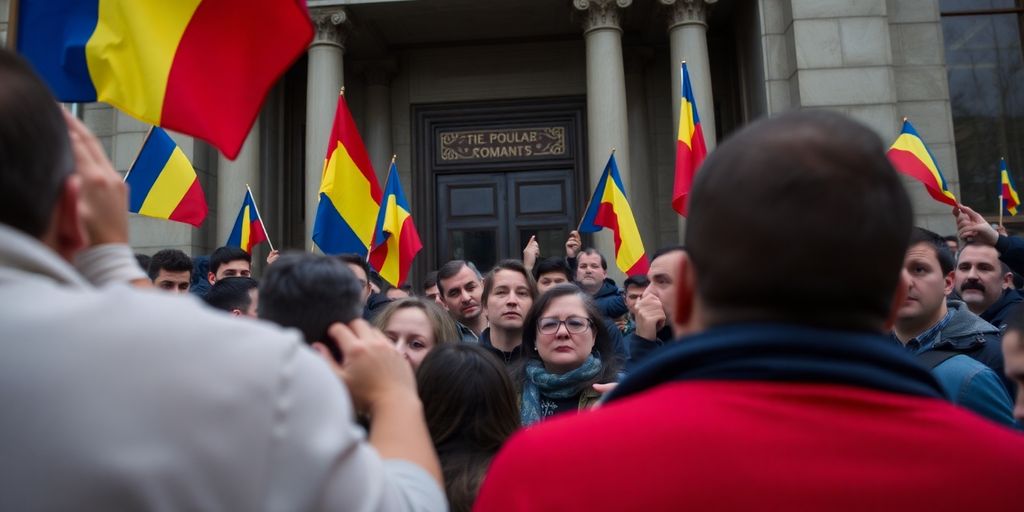Romania is engulfed in political turmoil as a district appeals court has ruled against the annulment of last year’s presidential election results, a decision that has been met with widespread criticism and confusion. This ruling comes just days before the country is set to hold a rerun of the presidential election, raising questions about the integrity of the electoral process and the influence of foreign powers.
Key Takeaways
- The Ploiești Court of Appeal overturned the Constitutional Court’s annulment of the presidential election results.
- The ruling has been described as creating "unprecedented legal chaos" in Romania’s political landscape.
- The upcoming presidential elections are scheduled for May 4 and May 18, despite the ongoing legal disputes.
- Allegations of Russian interference and electoral violations have marred the legitimacy of the previous election.
Background of the Controversy
The original presidential election, held in November 2024, saw Călin Georgescu, a far-right candidate with pro-Russian ties, unexpectedly leading the polls. However, the election results were annulled by Romania’s Constitutional Court on December 6, 2024, following allegations of foreign interference and electoral misconduct, including cyber-attacks and social media manipulation.
The annulment was based on declassified intelligence documents that suggested a coordinated effort to boost Georgescu’s campaign through misinformation and digital manipulation, particularly on platforms like TikTok.
The Recent Court Ruling
On April 25, 2025, the Ploiești Court of Appeal ruled to annul the Constitutional Court’s decision, stating that the annulment should itself be overturned. This decision has been met with skepticism from legal experts, who argue that the Constitutional Court’s rulings are final and cannot be challenged by lower courts.
- Legal Experts’ Opinions: Many legal analysts have criticized the Ploiești ruling as an absurdity, emphasizing that it contradicts established legal principles. Former judges have described it as a "judicial aberration" and called for an investigation into the motivations behind the ruling.
Implications for Upcoming Elections
Despite the legal chaos, Romania’s Central Electoral Bureau has stated that the ruling will not affect the upcoming presidential elections scheduled for May 4 and May 18. However, the political landscape remains fragmented, with various candidates vying for the presidency amid public disillusionment and distrust in the electoral process.
- Candidates to Watch:
- George Simion: Leader of the far-right Alliance for the Unity of Romanians (AUR), who is now leading in polls.
- Nicușor Dan: The incumbent mayor of Bucharest, running as an independent candidate.
- Crin Antonescu: Representing the ruling coalition, he is also a key contender.
Public Sentiment and Future Outlook
The political crisis has left many Romanians feeling disillusioned and skeptical about the integrity of their democratic institutions. Protests have erupted in response to the perceived manipulation of the electoral process, and there are growing concerns about the rise of far-right politics in Romania.
As the country approaches this critical election, the stakes are high. Observers warn that the outcome could significantly impact Romania’s relationship with the European Union and its standing in the geopolitical landscape, particularly in light of ongoing tensions with Russia.
In conclusion, Romania stands at a crossroads, with the upcoming elections serving as a litmus test for its democracy and the resilience of its political institutions. The legal battles and public sentiment surrounding this election will likely shape the future of Romanian politics for years to come.
Sources
- More Chaos as Romanian Court Overrules Annulment of Last Year’s Election ━ The European Conservative, The European Conservative.
- ‘Legal chaos’ as Romanian court rules against annulment of presidential vote | Romania, The Guardian.
- Romanian Legal Battle: Court Challenges Ruling That Invalidated Presidential Election Results, Novinite.com.
- Romania’s presidential election redo is a high-stakes test of its democracy following annulled vote, AP News.






